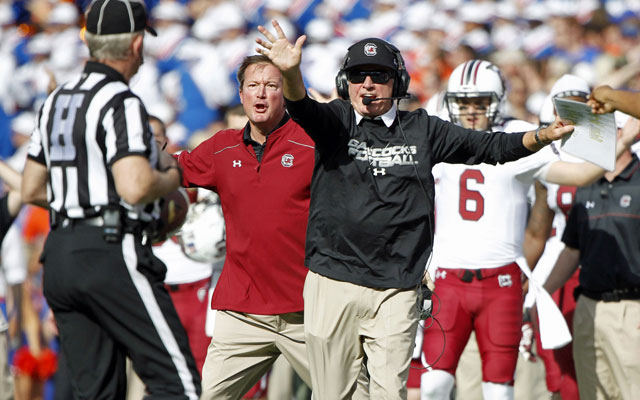Steve Spurrier is blunt. He always calls it like he sees it. So just because he's a legend, let's not spin his departure while celebrating his remarkable career.
He's an innovator. He's the second-most influential coach in SEC history behind Bear Bryant. He's a winner with unprecedented success at Duke, Florida and South Carolina. He's a character who immensely helped make college football become America's second-most popular sport.
There's also this: He's a proud man who deeply hates losing, and so barring any other information we don't know yet, he quit on his team in the end. That might not be exactly the way Spurrier wants to describe it, but it's hard to label his sad ending any other way.
Replace the name "Steve Spurrier" with almost any other coach who leaves a program halfway through the year and that person would get crushed by the public. Spurrier has enjoyed considerable goodwill from the media. Imagine the backlash if a player on a 2-4 team publicly said he's out of there. "Finish what you start" is preached in sports at all ages.
It's certainly Spurrier's right to leave whenever he wants to go play golf. South Carolina president Harris Pastides tried to talk Spurrier into announcing his retirement and finishing the year, but Spurrier wasn't interested.
"I find that doesn't work a lot, because if the players know you're not going to be their coach after such and such a time, you just don't have the accountability, I don't think," Spurrier said. "Also, it allows us a chance (for interim coach Shawn Elliott) to make his mark for these next six games. I think the team needs to hear a new message, a new voice from another coach."
In hindsight, it's clear Spurrier should have resigned after South Carolina's 7-6 season in 2014 given that he left halfway through this season. Spurrier said he doesn't regret not leaving at the time because "we got re-energized when we won the bowl game."
But August turned into a bizarre, impromptu news conference in which Spurrier warned against "enemies" attacking South Carolina in recruiting over speculation that he might retire. On Tuesday, he acknowledged he has become a "recruiting liability."
"Somehow or another, we've slipped," Spurrier said. "It's my fault. I'm the head coach. It's time for me to get out of the way."
This is who he is. Spurrier can't stand being this bad and it must kill him that two losing seasons bookend his brilliant college career. Some might argue it's better for Spurrier to leave halfway through the season than continue coaching while knowing he can't get through to his team. Still, he's leaving his players to finish this rough season that they and Spurrier all created together.
None of this is meant to diminish what Spurrier accomplished. There will never be another coach like him. Put aside the Florida Fun 'N' Gun years for a minute with his six SEC titles (he counts seven because the Gators won in 1990 while ineligible for a title), one national championship and a revolutionary offense that innovated 3-yards-and-a-cloud of dust in the SEC.
Spurrier won an ACC championship at Duke. At Duke! Spurrier went 33-6 at South Carolina from 2011 to 2013 with an SEC East title. At South Carolina!
Spurrier wondered, "Why not us?" at South Carolina and delivered. It can't be overstated how remarkable 11-win seasons are in Columbia, especially since Spurrier checked his ego at the door and relied on a ball-control offense for the Gamecocks to bust through the ceiling.
But it was in The Swamp where Spurrier transformed the SEC. While his teams put up "half a hundred" on opponents, Spurrier brashly displayed a vertical-passing offense that was unafraid to take shots downfield or keep running up the score. Spurrier was more than willing to play the villain -- a role that suited his game plans and ego and attracted wide audiences as the SEC became a more national conference.
For people of a certain age, you couldn't afford to not watch a game coached by Spurrier from 1990 to 2001. You risked missing something you might never see that dramatically clashed with the conservative nature of football back then. There was no greater drama than a game coached by Spurrier, the man you either loved or love to hate, as if he was a heel in pro wrestling.
Verbally jab any opponent and coach in sight? Check. Bench quarterbacks at will left and right? Check. Keep throwing while up 40 points? Check. Wear a visor and toss it on the sideline? Check.

Spurrier's influence can be seen all over college football today. His coaching tree includes Bob Stoops at Oklahoma and Charlie Strong at Texas. Auburn coach Gus Malzahn and Ole Miss coach Hugh Freeze wear visors in honor of Spurrier. Modern football's reliance today more on offense than defense to win comes in part from Spurrier's success, as does athletic directors' lust for offensive-minded coaches to sell tickets.
An often forgotten legacy of Spurrier is how he helped change the conversation about paying players. At the 2011 SEC Spring Meetings, Spurrier publicly offered to pay $300 per game to his players out of his own pocket. "As coaches in the SEC, we make all the money -- as do universities, television -- and we need to get more to our players," Spurrier said at the time. Spurrier privately warned SEC coaches he would name those on board with him. Then he named them, allowing the media to read between the lines which coaches didn't support the idea. Today, college football players get paid extra through a cost of attendance stipend.
But times change, especially when you lose. Spurrier became increasingly frustrated as the Gamecocks, with far less talent than in past seasons, kept losing. When South Carolina had a 2-2 record this season, Spurrier said he told his athletic director, Ray Tanner, he would try to finish the year but sensed this was the end.
"I think I was the best coach for this job 11 years ago but I'm not today," Spurrier said. "That's the cycle of coaching. ... You can't keep a head coach that has done it as long as I have when it starts going the wrong way."
Spurrier looked hurt Tuesday to be giving up coaching. He didn't even completely rule out coaching again, instructing the media to say he's resigning, not retiring. Spurrier suggested maybe one day he'll coach in high school or consult. Imagine being that high school who gets to learn X's and O's and hear stories from Spurrier.
As a 24-year-old in 1968, not long after winning the Heisman Trophy, Spurrier published an autobiography titled, It's Always Too Soon to Quit: The Steve Spurrier Story. In one part of the book Spurrier wrote, "It's always too soon to quit, when you believe in your fellow man and yourself."
Spurrier is 70 years old now. His legacy is a remarkable career as a colorful character whose candidness will be missed in a button-down world of college football, where too many coaches take themselves too seriously. Very few people will remember the end when Spurrier stopped believing in his players and himself.
As it turns out, though, it's never too late to quit.
Follow and read more from Jon Solomon on Facebook and Twitter.















